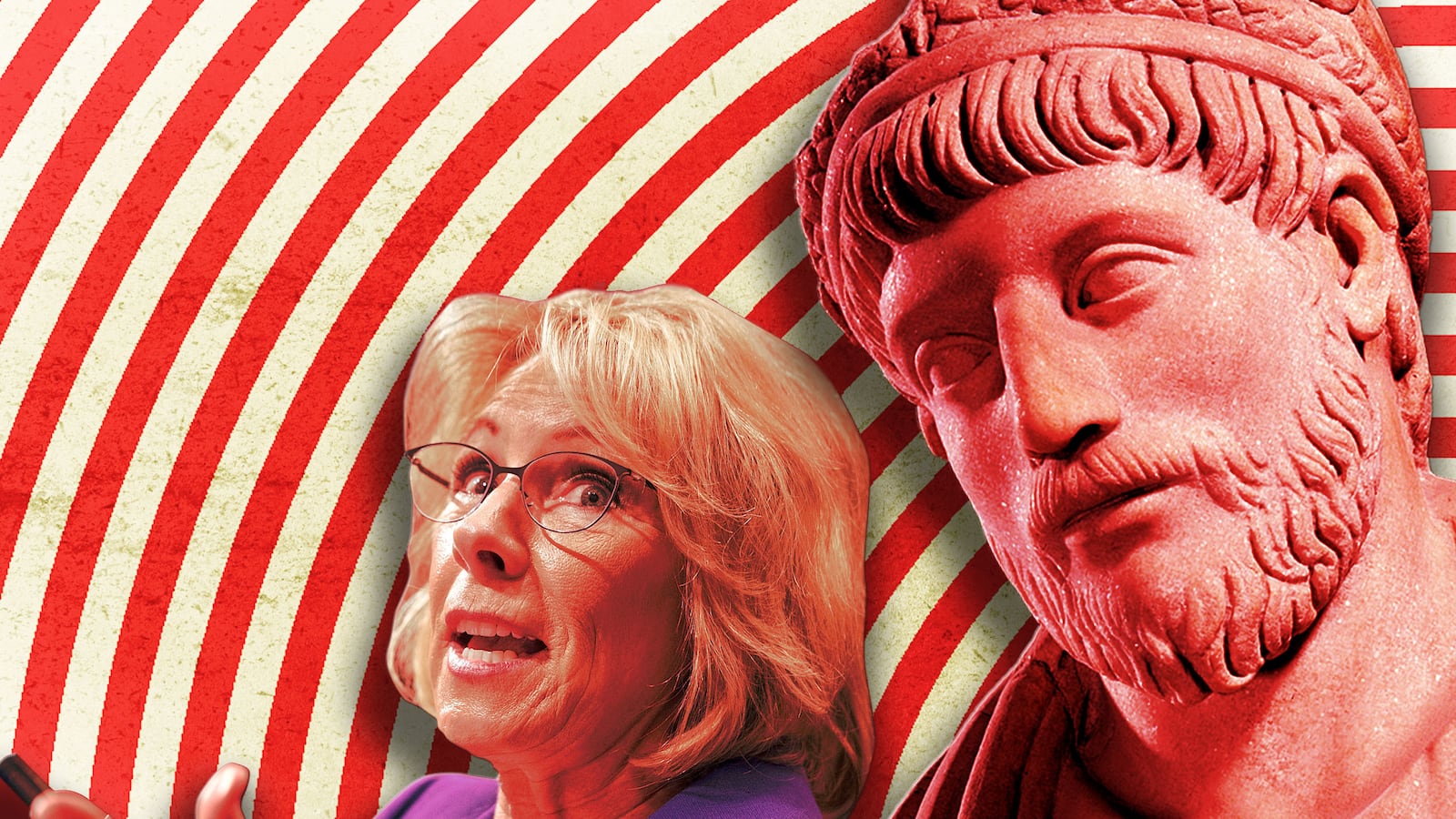Secretary of Education and Amway billionaire Betsy DeVos recently expressed her concern about the practice of higher education in the United States. In a speech at the Conservative Political Action Conference, DeVos accused faculty members of trying to indoctrinate students saying: “The faculty, from adjunct professors to deans, tell you what to do, what to say, and more ominously, what to think.”
The concern that education and educators have the power to manipulate young minds is nothing new. Ever since the Athenians put Socrates on trial for the charge of “corrupting the youth” governments have wondered about the potentially subversive influence of teachers on their students. Others have been more selective; one passage in the New Testament is concerned about the corrupting effects of gender, proscribing that women not teach men. Even in colonial America people were generally suspicious of academics, who, it seemed to them, didn’t really contribute to society in the way that, say, farmers did.
At certain points in history concerns about intellectuals have translated into policies and legislation that imprisoned instructors, restricted education, and banned certain sources of knowledge.
In 360 CE, Julian, a successful general and scholar, was proclaimed Augustus by his troops and became emperor of the Roman Empire. The empire had effectively been Christian since the reign of Constantine roughly half a century before, but Julian wanted to return the Roman Empire to the pagan religion and ideals of its founders. Julian was a believer in widespread cultural tolerance and grew up Christian but in 351 he converted to paganism. Christian sources tell us that Julian didn’t persecute Christians but he did prohibit them from teaching the classics. “If they want to learn literature, they have Luke and Mark: let them go back to their churches and expound them.” With a couple of exceptions, Christian teachers now had to focus on teaching the New Testament, a move that effectively ended the careers of many.
Julian’s scheme didn’t outlaw Christianity but it did tightly control who could educate the future leaders of Roman society. By controlling education and expelling those who did not support his reforms, Julian was able to affect the shape of society. As lauded historian Peter Brown has argued, the same thing happened in 13th-century China, when the Confucian mandirinate drove Buddhism out of the ranks of educated elites.
Religious authorities, in particular, have had a tough time with the seemingly audacious claims of scientists. We all know the stories of Galileo, but 16th-century mathematicians who challenged the nature of continua (straight lines and shapes, to you and me) also faced considerable opposition. Not only were they, as Amir Alexander has shown, drawn into heated debates with Euclidean mathematicians, they were censored by Jesuit authorities and driven out of Italy. The subject matter was, quite literally, infinitesimally small, but the stakes were enormously high.
The best known incidents of expulsion and academic censorship are the 1933 civil service laws in Germany that effectively purged the academy of Jewish and left-leaning faculty; Stalin’s purge of the Academy of Sciences in 1937; and Joe McCarthy’s anti-communist witch hunts in the 1950s. In situations of political unrest academics often choose to leave centers of learning because they fear persecution or censorship. This only benefits less tyrannical regimes: when the Huguenots were expelled from France in 1685 they took their intellectuals with them to the Prussian court at Brandenburg.
To an extent, though, DeVos is correct: all education is formative. That’s the case whether we are talking about kindergarten, a museum, or a university. Just deciding what to teach in history classes reveals an implicit assessment of the kinds of events and people that are more or less important for our understanding of our past and ourselves. For most of the modern period, history classes focused on great leaders and important battles. History meant political and military history and focused almost exclusively on white men and their accomplishments. In the past fifty years the task of history has changed; scholars have come to the realization that social history matters and that if we want to understand who we are now we should also study the voices and experiences of slaves, women, people of color, people with disabilities, and other marginalized groups.
So, yes, education has implicit bias, and it’s precisely because of that bias that most educators provide space to question everything. Just because classes and faculty have curriculum, syllabi, and implicit (or sometimes explicit) ideological bias does not mean that academics tell people “what to think.” Most classrooms and lecture halls are spaces in which students are encouraged to challenge the status quo. Full disclosure: I’m an academic myself and I explicitly tell students that I am more interested in getting them to think than in what they end up thinking. In this respect I’m completely ordinary. So far as I can tell every one of my friends and colleague-acquaintances at other institutions does the same thing, because the purpose of higher education is to teach people to think for themselves.
This is not to say that I wouldn’t like to force students into retaining certain information; policies on submitting late assignments, for example. Faculty can only raise an eyebrow at DeVos’s assessment of the power of individual professors. “Tell students what to do and say?” one colleague told me, “I can barely get them to follow the syllabus.”




